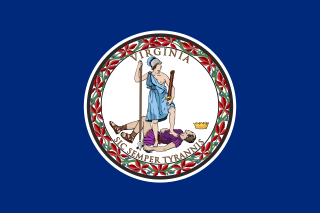
The governor of the Commonwealth of Virginia serves as the head of government of Virginia for a four-year term. The incumbent, Glenn Youngkin, was sworn in on January 15, 2022.

The Solid South or the Southern bloc was the electoral voting bloc of the states of the Southern United States for issues that were regarded as particularly important to the interests of Democrats in those states. The Southern bloc existed between the end of the Reconstruction era in 1877 and the passage of the Civil Rights Act of 1964. During this period, the Democratic Party overwhelmingly controlled southern state legislatures, and most local, state and federal officeholders in the South were Democrats. During the late 1800s and early 1900s, Southern Democrats disenfranchised blacks in all Southern states, along with a few non-Southern states doing the same as well. This resulted essentially in a one-party system, in which a candidate's victory in Democratic primary elections was tantamount to election to the office itself. White primaries were another means that the Democrats used to consolidate their political power, excluding blacks from voting in primaries.
The Supreme Court of Appeals of West Virginia is the state supreme court of the state of West Virginia, the highest of West Virginia's state courts. The court sits primarily at the West Virginia State Capitol in Charleston, although from 1873 to 1915, it was also required by state law to hold sessions in Charles Town in the state's Eastern Panhandle. The court also holds special sittings at various locations across the state.
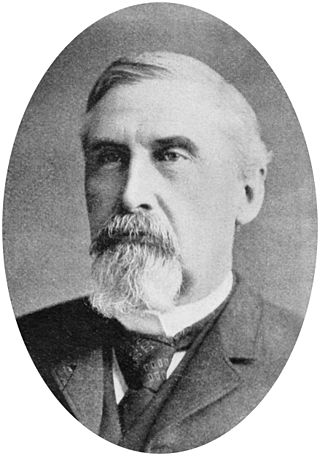
John Jeremiah Jacob was a Democratic politician from Green Spring in, in the U.S. state of West Virginia. Jacob served two terms as the fourth governor of West Virginia. He was also elected to the West Virginia House of Delegates from Hampshire County in 1868 and from Ohio County in 1879.

George Franklin Fort was a physician, judge, and Democratic Party politician who served as the 16th Governor of New Jersey from 1851 to 1854.

Johnson Newlon Camden was a prominent oilman, industrialist, banker, railroad tycoon, and politician who was estimated to be worth $25 million at the time of his unexpected death. Although both of his attempts to become governor of the new state of West Virginia failed, he did become United States Senator, representing West Virginia on two occasions.

The West Virginia Democratic Party is the affiliate of the Democratic Party in the U.S. state of West Virginia.

The 1894–95 United States Senate elections were held on various dates in various states. As these U.S. Senate elections were prior to the ratification of the Seventeenth Amendment in 1913, senators were chosen by state legislatures. Senators were elected over a wide range of time throughout 1894 and 1895, and a seat may have been filled months late or remained vacant due to legislative deadlock. In these elections, terms were up for the senators in Class 2.

James Monroe Jackson was a lawyer and Democratic politician from West Virginia who served as a United States Representative in the 51st United States Congress.

The 2011 United States elections were held on Tuesday, November 8. This was an off-year election, in which the only seats up for election in the United States Congress were special elections. There were also four gubernatorial races, including a special election in West Virginia. There were also state legislative elections in four states and judicial elections in three states; as well as numerous citizen initiatives, mayoral races, and a variety of other local offices on the ballot.
Cornelius Clarkson Watts (1848–1930), or C. C. Watts, was an American lawyer and politician. He served as United States Attorney for the District of West Virginia and Attorney General of West Virginia. In 1896, Watts was the Democratic party candidate for Governor of West Virginia.

The 1874–75 United States Senate elections were held on various dates in various states. As these U.S. Senate elections were prior to the ratification of the Seventeenth Amendment in 1913, senators were chosen by state legislatures. Senators were elected over a wide range of time throughout 1874 and 1875, and a seat may have been filled months late or remained vacant due to legislative deadlock. In these elections, terms were up for the senators in Class 1.

The 2014 United States elections were held on Tuesday, November 4, 2014, in the middle of Democratic President Barack Obama's second term. Republicans retained control of the House of Representatives and won control of the Senate.

The 2017 United States elections were held, in large part, on Tuesday, November 7, 2017. This off-year election featured gubernatorial elections in Virginia and New Jersey, as well as state legislative elections in both houses of the New Jersey Legislature and in the Virginia House of Delegates. Numerous citizen initiatives, mayoral races, and a variety of other local elections also occurred. Special elections were also held for one seat of the U.S. Senate, representing Alabama, and six seats of the U.S. House of Representatives. The Democrats picked up the governorship in New Jersey and the Alabama Senate seat that was up for a special election. The governorship in Virginia and the six House seats that were up for special elections did not change party hands.
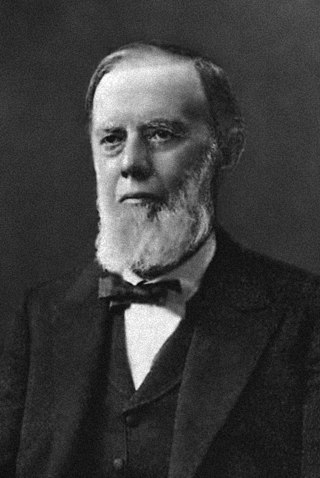
Edwin Maxwell was an American lawyer, judge, and politician in the U.S. state of West Virginia. Maxwell served as Attorney General of West Virginia in 1866 and was an associate justice of the Supreme Court of Appeals of West Virginia from 1867 until 1872. He was elected to the West Virginia Senate and the West Virginia House of Delegates.
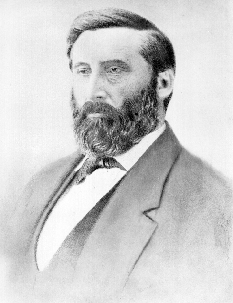
The 1870 West Virginia gubernatorial election took place on October 27, 1870, to elect the governor of West Virginia.

The 2024 United States elections are scheduled to be held on Tuesday, November 5, 2024. During this presidential election year, the President of the United States and Vice President will be elected. In addition, all 435 seats in the United States House of Representatives and 34 of the 100 seats in the United States Senate will be contested to determine the membership of the 119th United States Congress. Thirteen state and territorial governorships and numerous other state and local elections will also be contested.
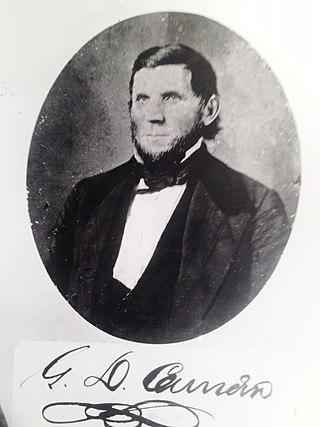
Gideon Draper Camden was an American lawyer, judge and politician who opposed the creation of the state of West Virginia and sympathized with the Confederacy, but later served in the West Virginia Senate representing Harrison County.



















